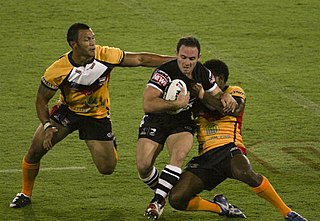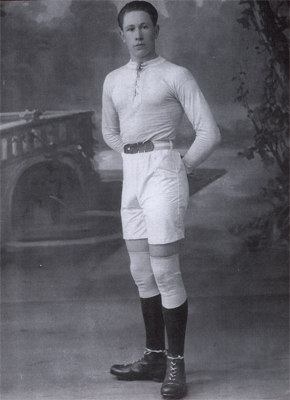Related Research Articles

Rugby football is the collective name for the team sports of rugby union and rugby league.

Rugby league football, commonly known as just rugby league and sometimes rugby, football, footy or league, is a full-contact sport played by two teams of thirteen players on a rectangular field measuring 68 m (74 yd) wide and 112–122 m (122–133 yd) long with H shaped posts at both ends. It is one of the two codes of rugby football, the other being rugby union. It originated in 1895 in Huddersfield, Yorkshire, England as the result of a split from the Rugby Football Union (RFU) over the issue of payments to players. The rules of the game governed by the new Northern Rugby Football Union progressively changed from those of the RFU with the specific aim of producing a faster and more entertaining game to appeal to spectators, on whose income the new organisation and its members depended. Due to its high-velocity contact, cardio-based endurance and minimal use of body protection, rugby league is widely regarded as the toughest and most brutal collision sport in the world.

The history of rugby league as a separate form of rugby football goes back to 1895 in Huddersfield, West Riding of Yorkshire when the Northern Rugby Football Union broke away from England's established Rugby Football Union to administer its own separate competition. Similar schisms occurred later in Australia and New Zealand in 1907. Gradually the rugby played in these breakaway competitions evolved into a distinctly separate sport that took its name from the professional leagues that administered it. Rugby league in England went on to set attendance and player payment records and rugby league in Australia became the most watched sport on television. The game also developed a significant place in the culture of France, New Zealand and several other Pacific Island nations, such as Papua New Guinea, where it has become the national sport.

Stoolball is a sport that dates back to at least the 15th century, originating in Sussex, southern England. It is considered a "traditional striking and fielding sport" and may be an ancestor of cricket, baseball, softball, and rounders. The sport has been called "cricket in the air". There is evidence to suggest that it was played as a tradition by milkmaids who used their milking stools as a "wicket" and the bittle, or milk bowl as a bat, hence its archaic name of bittle-battle.

Sport in the United Kingdom plays an important role in British culture and the United Kingdom has played a significant role in the organisation and spread of sporting culture globally. In the infancy of many organised sports, the Home Nations, England, Scotland, Wales, and Ireland were heavily involved in setting out the formal rules of many sports, and formed among the earliest separate governing bodies, national teams and domestic league competitions. After 1922, some sports formed separate bodies for Northern Ireland, though many continued to be organised on an all-Ireland basis. For this reason, in many though not all sports, most domestic and international sport is carried on a Home Nations basis, and England, Wales, Scotland and Ireland are recognised as national entities.

Football in Australia refers to numerous codes which each have major shares of the mainstream sports market, media, broadcasting, professional athletes, financial performance and grassroots participation: Australian rules football, rugby league, rugby union and association football. There are four pre-eminent professional football competitions played in Australia: the Australian Football League, the National Rugby League, Super Rugby and the A-League (soccer). By most measures, including attendance, television audience and media presence across the most states, Australian football is the most popular nationally. However, in the states of New South Wales and Queensland, rugby football is overall the most watched and receives the most media coverage, especially the Rugby League State of Origin contested between the two states referred to as “Australian sport's greatest rivalry”. In recent times there has been an increase in popularity in Australian football and corresponding decrease in popularity of Rugby union in New South Wales and Queensland. Soccer, while extending its lead in participation rate particularly in the large cities and improving its performance at the FIFA World Cup, continues to attract the overall lowest attendance as well as media and public interest of the four codes.
Rugby league is a sport played in Wales. The governing body of the game in Wales is the Wales Rugby League.

Sport is an important part of Australia that dates back to the early colonial period. Australian rules football, rugby league, rugby union, association football, cricket and tennis are among the earliest organised sports in Australia. Sport has shaped the Australian national identity through events such as the Melbourne Cup and the America's Cup. Australia also holds the record for the largest attendance at a Rugby Union match with almost 110 000 watching the Wallabies play the All Blacks in 2000.

The English game of dwile flonking is an East Anglian pub game, involving two teams of twelve players, each taking a turn to dance around the other while attempting to avoid a beer-soaked dwile (cloth) thrown by the non-dancing team.

In sports, a loan involves a particular player being able to temporarily play for a club other than the one to which they are currently contracted. Loan deals may last from a few weeks to a full season, sometimes persisting for multiple seasons at a time. A loan fee can be arranged by the parent club as well as them asking to pay a percentage of their wages.

The team sports rugby union and rugby league have shared origins and thus many similarities.

Sport in Wales plays a prominent role in Welsh culture. Like the other countries of the United Kingdom, Wales enjoys independent representation in major world sporting events such as the FIFA World Cup and in the Rugby World Cup, but competes as part of Great Britain in some other competitions, including the Olympics.

Jean Galia was a French rugby union and rugby league footballer and champion boxer. He is credited with establishing the sport of rugby league in France in 1934, where it is known as rugby à treize.
The 1908–09 Northern Rugby Football Union season was the 14th season of rugby league football in the United Kingdom.

Football is a family of team sports that involve, to varying degrees, kicking a ball to score a goal. Unqualified, the word football normally means the form of football that is the most popular where the word is used. Sports commonly called football include association football ; gridiron football ; Australian rules football; rugby union and rugby league; and Gaelic football. These various forms of football share to varying extents common origins and are known as "football codes".

The 1910 Great Britain Lions tour of Australia and New Zealand was the first international tour of the Great Britain national rugby league team, "The Lions". They played the second ever Ashes series against Australia, and their first as the visiting team, before travelling to Auckland to take on New Zealand. The tour was a huge promotional and financial success for what was then known as the "Northern Union" game and helped set the pattern for regular, alternating test match series between Britain and Australia. It is regarded as one of the most important events in the history of rugby league.
The history of sport in Australia dates back to the pre-colonial period of the country.
The Rugby league transfer record is the highest-ever sum of money paid by a club to purchase the contract, and thereby obtain the playing services of another club's player. It has been broken in every decade since the sport became professional around the start of the 20th century. Between the 1930s and 1980s, international transfer bans were imposed, removed and renewed at different times due to the sport's governing bodies' fears of excessive talent drain overseas. In 1998, the sport's transfer system was changed to allow any player aged 24 or over to move between clubs at the end of their contract without a fee being paid. As a result, transfer fees in rugby league became much more uncommon. The current record fee paid is £700,000, paid by the New Zealand Warriors to the Wigan Warriors in 2013 for Sam Tomkins.
The 1920 Great Britain Lions tour was the third British national rugby league team or 'Lions' tour of Australasia, where it was winter and matches were played against the Australian and New Zealand national sides, as well as several local teams. In Australia, the three-Test match series was won by the hosts. In New Zealand another three-Test series was played and won by the visitors. The tour was a success and brought in a handsome profit.
Loughborough Lightning are a women's rugby union club based in Loughborough, Leicestershire, England. They are the women's team of Loughborough Students RUFC and Loughborough University. Together with the netball team and the women's cricket team, the rugby union team is one of three women's sports teams based Loughborough University that use the Loughborough Lightning name. In 2017, they were selected as a franchise for the inaugural Premier 15s season.
References
- ↑ Redfern, Simon (5 April 2009). "Sports Book of the Week: A Social History of English Rugby Union, by Tony Collins". The Independent . Archived from the original on 10 April 2009. Retrieved 24 April 2010.
- ↑ Harris, John (11 June 2009). "A Social History of English Rugby Union". Times Higher Education . Archived from the original on 2 September 2012. Retrieved 24 April 2010.
- ↑ "Meet The Historians". De Montfort University. Retrieved 30 December 2020.
- ↑ "Tony Collins". Institute of Sports Humanities. University of Buckingham. Retrieved 30 December 2020.
- ↑ Rugby Reloaded.
- ↑ "About". Rugby Reloaded. Retrieved 30 December 2020.
- ↑ "Lord Aberdare Literary Prize". www.sportinhistory.org. British Society of Sports History. Archived from the original on 22 December 2019. Retrieved 30 December 2020.
- ↑ "A Social History of English Rugby Union". www.routledge.com. Routledge. Retrieved 30 December 2020.
- ↑ "Rugby Reloaded". Soundcloud. Retrieved 30 December 2020.
- ↑ "RFL Roll of Honour". rugby-league.com. Rugby Football League. Retrieved 30 December 2020.
- ↑ "Sport and the British". www.bbc.co.uk. BBC. Retrieved 30 December 2020.
- ↑ "Football: A Brief History". www.history.co.uk. Sky. Retrieved 30 December 2020.
- ↑ "The Rugby Codebreakers". www.bbc.co.uk. BBC. Retrieved 30 December 2020.
- ↑ "The Story of Rugby". www.inmotion.dhl. DHL. Retrieved 30 December 2020.
- ↑ "Shane Williams: Rugby, Concussion & Me". www.bbc.co.uk. BBC.
- ↑ "George Hotel's Rugby League Heritage Centre memorabilia to go on tour". Huddersfield Examiner. 23 September 2014. Retrieved 30 December 2020.
- ↑ "Hull KR Community Trust". www.company-information.service.gov.uk/. Companies House. Retrieved 30 December 2020.
- ↑ "Minutes" (PDF). www.heritagefund.org.uk. Heritage Lottery Fund. Retrieved 30 December 2020.
- ↑ "Editorial Board". Taylor & Francis Online. British Society of Sports History. Retrieved 30 December 2020.
- ↑ "Rugby League in twentieth century Britain : a social and cultural history / Tony Collins". British Library . Retrieved 23 April 2010.
- ↑ "Rugby's great split : class, culture and the origins of rugby league football / Tony Collins". British Library . Retrieved 23 April 2010.
- ↑ "Mud, sweat and beers : a cultural history of sport and alcohol / Tony Collins and Wray Vamplew". British Library . Retrieved 23 April 2010.
- ↑ "Rugby's great split : class, culture and the origins of Rugby League football / Tony Collins". British Library . Retrieved 23 April 2010.
- ↑ Richards, Huw (12 December 2009). "Christmas books: sport". The Gear. The Guardian. Archived from the original on 4 September 2014. Retrieved 23 April 2010.
- ↑ "Encyclopedia of traditional British rural sports / edited by Tony Collins, John Martin, and Wray Vamplew". British Library . Retrieved 23 April 2010.
- ↑ "'Ahr Waggy' : Harold Wagstaff and the making of Anglo-Australian rugby league culture / Tony Collins". British Library . Retrieved 23 April 2010.